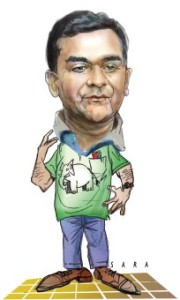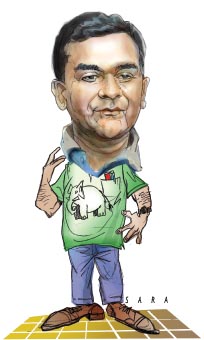- The agreement to devolve power was for the entire country and not only the North

Following are excerpts of the interview:
Q: What is the UNP’s stance on the allocation of land and police powers to the Provincial Councils?
A: The 13th Amendment is part of the Constitution and the Supreme Court and parliament have approved it. There’s no problem with land and police powers under the Constitution. There is a problem with implementing them, but it is not a separate issue. It has now been made a political issue. Implementing the 13th Amendment is legal. However, the government’s attempt to remove land and police powers will be a problem. If the independent police commission is established there would not be a problem in giving police powers to the provinces. This issue can be solved, but the government instead of dong that is trying to change the system according to its agenda, thereby creating an ethnic issue. The law in the Constitution should not be changed. The Provincial Council system was established with the consensus of the government and the international community. The government when it can solve the issue is trying to create a problem. The 13th Amendment is in the Constitution and should be implemented.
Q: The 13th Amendment to the Constitution was introduced by a former UNP government and even then land and police powers were not allocated to the provinces? Why do you think that was?
A: The Provincial Council system was started during the UNP government. The problem in the North was to be solved through the Provincial Councils. However, there was no space to establish a Provincial Council in the North, but the Provincial Councils were established in the South. Administrative work commenced in the provinces, but not all administrative work was completed. Land and police powers were not a problem in the South. The government and the Provincial Councils worked together so there was no problem. The problem is with the North since a civil administration has to be set up there and the government should show its sincerity in establishing a civil administration. The government promised to give provincial council powers to the North. The President told the Indian Foreign Minister that the government would go beyond the 13th Amendment and the President’s LLRC has also proposed the same
.
Q: Does the UNP believe that the provincial council system could resolve the ethnic issue?
A: The UNP in 1987 proposed the 13th Amendment as a solution to the ethnic issue. The political atmosphere at the time also had an impact on it. It was following an international agreement between India and Sri Lanka and it was not between Rajiv Gandhi and JR. The agreement to devolve power was aimed at the entire country and not only to the North. The Provincial Councils if active would somewhat address the ethnic issue. However, the government is avoiding it. Establishing separate units based on ethnicity is not good. There needs to be a common ground. A lot of problems could be solved. There is no 100 percent civil administration in the North. The local government bodies do not function properly and the government and security forces intervene. In order to prevent an ethnic issue, the Provincial Council system has to be implemented with sincerity.
Q: The proposed draft Constitution presented by the UNP says that there would be a meaningful devolution of power and it has given some examples that would be followed. Will the UNP fully implement the 13th Amendment or go beyond the 13th Amendment?
A: Our stance is based on several areas. There are lots of reports on it. There’s the Tissa Vitharana report, the President’s LLRC report, the agreement reached between the government and the UN Secretary General and the statements made before the UNHRC. These are all documents that deal with this matter and the government had agreed to these. Our proposal is to work taking into consideration all these along with the 13th Amendment.
Q: Do you feel that the government would hold the Northern Provincial Council elections given the current issues over the 13th Amendment?
A: Even people in the North have doubts. If the government holds the Northern Provincial Council elections, it would only be to show the world. The CHOGM is in Sri Lanka in November and the government would want to prevent any bad publicity. The government would therefore hold an election for the sake of it. People in the North are still living in fear. They do not have the freedom to cast their votes or have a political movement. Security forces personnel in civvies attacked a protest campaign organized by the Opposition Leader and political parties and organizations in the North. The TNA’s political rally in Kilinochchi was also destroyed by an organized group. If the LTTE does not exist then there cannot be an armed group in the North. Therefore, there is no space for the people to cast their vote freely. We emphasize three issues – first is the need for a civil governor to the North since the current governor is a retired military officer and people don’t have faith in him; second is the need for Commonwealth and EU monitors for the Northern polls as observers from the period of nominations until the conclusion of elections and; third is the re-enacting of the 17th Amendment and the establishment of independent Police and Elections Commissions. The independent Police Commission must be created and should be given the freedom to carry out its work. If the government is going to hold an election without these factors then the government has no intention of holding a free and fair election.
Q: Why do you think that holding the Northern Provincial Council election is important?
A: The main reason is the re-establishment of a civil administration in the North. There has not been a civil administration close to three decades. Although there have been local government elections and Presidential and general elections from time to time, they have all been held under military supervision. The actions of the LTTE also prevented the people in the North from casting their votes freely. The LTTE prevented people from casting their votes for a candidate of their choice at the 2005 Presidential election. After a war, the government has to democratically create the environment for people to be free. The only way is to give their representatives the chance to work in public councils. It has now become an international issue. The government met the UN Secretary General and promised to hold Northern Provincial Council election in September. The US government representatives have also said that they have been informed Northern elections would be in September. The election is under international scrutiny. Indian leaders have also been promised the same. So a civil administration has to now be established.
Q: How does the UNP view the JHU’s motion handed to Parliament seeking the abolition of the Provincial Council system?
A: We don’t accept it. The Provincial Council system was never seen as a move for separatism. It is the devolution of power approved by courts.
The Provincial Council system is legal. Provincial Councils are not only for the North, but also the South. Despite claims of shortcomings in the system, it is a system of power devolution at provincial level. The Northern issue is the main problem and it could be resolved with the devolution of power. Sri Lanka is a country where Sinhalese, Muslims and Tamils live. Therefore, it is important to act responsibly towards all ethnic groups and religions. The JHU’s private member’s motion has been presented to Parliament as a stakeholder of the government. On the other hand, government leaders have not told the country about going beyond the Provincial Councils, so we would like to know the government’s stance on the matter as well. Also, the JHU has members in the Provincial Councils and the party has a minister in the Western Provincial Council. The JHU has accepted the Provincial Councils and contested and is using its powers, but says it doesn’t want the Provincial Council system.
Q: How do you think a move to change the 13th Amendment would impact on the government, the country and the reconciliation process?
A: The government’s stance will further divide the communities. What did the President expect from the LLRC? Following the end of the war the President and the government continuously said that a civil administration would be established in the North. The LLRC was established and the Commission has made its proposals. India and the international community have been given many promises. The government is now trying to avoid this by bringing forward racism and religious extremism. We call on the government not to make a mess of the issue and bring about a breakdown in the reconciliation process. It would not be good for the country’s future.
Q: What impact would a delay in holding the Northern Provincial Council elections have on Sri Lanka’s relations with the international community?
A: It would result in the loss of confidence in the government. The UN Secretary General was told that the Northern polls would be held on September 10th. The UNHRC was also told the same. The government has assured India as well. Instead of honouring these pledges, the government is now trying to avoid them by making various statements on power devolution to the North creating a negative impact on the country’s image. A lack of confidence by the international community would affect the country. We should never be a country with racism and religious extremism. However, the government’s actions show that the country is being dragged down such a path. We will therefore face many challenges.
Q: What role would the UNP play in ensuring that the government will hold the Northern Provincial Council elections?
A: The UNP has continuously asked the government to hold the Northern Provincial Council elections as the first step in establishing a civil administration in the North. It should be a free and fair election. The government must hold the election according to its pledge. We will continue to force the government to honour its pledge both inside and outside parliament.
TA
